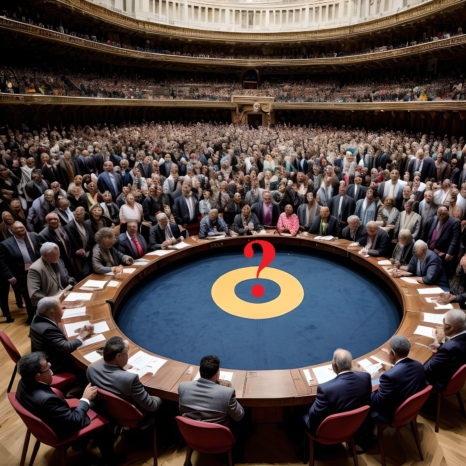Escritos publicados en la red social Facebook.
Categoría: Escritos en Facebook

(Español)
«Que quien tenga oídos oiga.
Lo que sigue es totalmente independiente del contexto de la vida en que se aplique.
Para salir de cualquier profundo y aparentemente inescapable agujero en el que estemos no vale con saltar o intentar correr veloz hacia los bordes: hay que ampliar los horizontes e ir echando cuidadosamente la tierra desechada de esa ampliación bajo nuestros pies.
Esta es una ley evidente en la naturaleza.
Repito: Que quien tenga oídos oiga»
[Agustín Barahona]
(English)
«Let those who have ears hear.
What follows is totally independent of the context of life in which it is applied.
To escape from any deep and seemingly inescapable hole in which we find ourselves, it is not enough to jump or try to quickly run towards the edges: we must expand our horizons and carefully scatter the discarded soil from that expansion beneath our feet.
This is an evident law in nature.
I repeat: Let those who have ears hear.»
[Agustín Barahona]
Otros artículos quasi aforísticos vinculados:
Filosofía y Ciencia. | ¿Razonando se entiende la gente? (agustinbarahona.com)
Dogmático versus filósofo | ¿Razonando se entiende la gente? (agustinbarahona.com)
Sobre la honestidad del filósofo verdadero. | ¿Razonando se entiende la gente? (agustinbarahona.com)
SABIDURÍA Y ENFOQUE: C… | ¿Razonando se entiende la gente? (agustinbarahona.com)
¿Es lo mismo sabiduría que conocimiento? | ¿Razonando se entiende la gente? (agustinbarahona.com)
La paradoja del conocimiento | ¿Razonando se entiende la gente? (agustinbarahona.com)

(Español)
PRESENTACIÓN DEL TEMA
A menudo he hecho consultas públicas de índole legal. Preguntaba a quién hay que pedir permiso para iniciar un periodo constituyente. O, también, qué pasaría si un representante legal de todos los españoles se presentara en las Cortes. Y entregándola y en sus manos una nueva Constitución.
Imaginad allí la Carta magna. Firmada por todos y cada uno de los españoles con poder de obrar o por su inmensa mayoría. Ley fundacional de una real democracia, en cuya elaboración habrían tenido todos oportunidad demostrada de haber participado. Y todo tras consultar no vinculantemente a juristas que, por ello precisamente habrían educado a los participantes. Educación imprescindible para que entendiesen cómo debería ser la forma jurídicamente eficiente de las voluntades de los españoles.
Pero nunca me han respondido, ni pública ni privadamente. Y es algo que me llama poderosamente la atención. Y no es para menos, pues la pregunta que hago parece muy fácil de responder. Claro está, siempre que se haga con lógica, honestidad y justicia como guías de las posibles respuestas.
¿A QUIÉN HAY QUE PEDIR PERMISO PARA INICIAR UN PROCESO CONSTITUYENTE?
Si el Poder Legislativo reside en el pueblo es a éste a quien compete poder elaborar las normas. Es verdad que el pueblo no ha elegido independientemente a sus representantes para garantizar la representatividad efectiva de esos diputados. Pero entendemos que a pesar de ello cumplen supuestamente esa función para evitar el vacío legal. Sin embargo, entiendo que el representado tiene todo el derecho a recusar o a prescindir de los servicios del representante que no cumple bien su trabajo. Y lo hace contratando a otro representante que sí demuestre realizar el trabajo para el que es contratado.
Pero si además, como ocurre actualmente gracias a la tecnología, no existe necesidad alguna de que el pueblo sea representado por alguien, entonces con mucha más legitimidad puede el que se considera no-representado actuar en su propio nombre sin necesidad de tener que contratar a un nuevo representante. Ya sabemos que, lógicamente, todo acto y voluntad del representado prevalece sobre los del representante que no coincide con ellos.
Es en ese sentido que se produce mi primera duda. ¿A quién, pues, tendría que pedir permiso el pueblo español para constituir su propia constitución? ¿A quién tendrían que pedir permiso para despedir por incompetencia e ineptitud a sus supuestos representantes hasta ese momento?
¿Y SI SE ENTREGARA UNA NUEVA CONSTITUCIÓN YA FIRMADA POR TODOS O LA INMENSA MAYORÍA DE LOS ESPAÑOLES?
Del mismo modo, no existe ninguna norma que impida que entre los españoles podamos comunicarnos por diversos medios para conocer opiniones, razonamientos, críticas, textos, etc que puedan o no sernos interesantes. Los Derechos fundamentales de la libre expresión, libertad de información, libertad de pensamiento, etc, nos avalan y protegen a ese respecto, en teoría.
Teniendo esto en cuenta, sería muy sencillo elaborar el texto de una nueva constitución hipotética con el fin de ver qué opinarían todos los españoles acerca de la fundamentación pragmática y jurídica que cada artículo tuviese. Fundamentación pragmática y jurídica que sería ratificada por razonamientos pragmáticos y jurídicos sin lugar a duda alguna.
Y, de este modo, podríamos entre todos mejorar nuestros criterios a la hora de enjuiciar normas pasadas, presentes o futuras. Con ese fin didáctico-político inalienable, entre todos podríamos construir una hipotética nueva Constitución como soporte didáctico para hacer Filosofía del razonamiento político, todo ello con criterios siempre científicos, informados.
Esto tendría como consecuencia inevitable que esa constitución-soporte-didáctico sería de hecho y de derecho igual que un texto realizado por un espontáneo periodo pacífico y pedagógico constituyente. Y si todos los españoles quisieran finalmente poner su firma a dicho proyecto resultativo no habría problema legal alguno en plantearlo legalmente a las Cortes como una nueva constitución propuesta, de facto. Además, en ese caso, sería una constitución que SÍ habría sido hecha y aprobada por el colectivo colegiado libre y constituyente, puesto que así se habría dirigido la propuesta a las Cortes, por cualquiera de las vías legales que tenemos.
Es en ese sentido que se produce mi segunda duda. ¿Qué tendría la legitimidad para rechazar una nueva Constitución realizada en esas condiciones más que ideales?
CONCLUSIÓN
Conste que, como siempre, mis preguntas son hipotéticas y motivadas, también como siempre, con fines didácticos. Siempre para intentar que la mayoría de la gente pueda disfrutar del derecho inalienable de poder percibir la realidad por sí mismos y de sacar sus propias conclusiones en el ejercicio del aprendizaje de cómo obtener el mejor razonamiento. Que es siempre aquél que no puede ser negado racionalmente.»
[Agustín Barahona]
(English)
INTRODUCTION OF THE TOPIC
«I have often made public legal inquiries. I asked who needs to be asked for permission to initiate a constituent period. Or, also, what would happen if a legal representative of all Spaniards appeared in the Courts. Handing over a new Constitution.
Imagine the Magna Carta there. Signed by each and every one of the Spaniards with the power to act or by the vast majority. Foundational law of a real democracy, in whose elaboration everyone would have had the demonstrated opportunity to participate. And all this after consulting non-bindingly with jurists who would have educated the participants for this very reason. Essential education for them to understand how the legally efficient form of the will of the Spaniards should be.
But they have never answered me, neither publicly nor privately. And it is something that catches my attention powerfully. And not for less, since the question I ask seems very easy to answer. Of course, always as long as it is done with logic, honesty, and justice as guides for possible answers.
WHOM SHOULD BE ASKED FOR PERMISSION TO INITIATE A CONSITUENT PROCESS?
If the Legislative Power resides in the people, it is they who have the competence to elaborate the rules. It is true that the people have not independently chosen their representatives to guarantee the effective representation of these deputies. But we understand that despite this, they supposedly fulfill that function to avoid legal vacuums. However, I understand that the represented person has every right to challenge or dispense with the services of the representative who does not perform his job well. And he does so by hiring another representative who demonstrates that he performs the work for which he is hired.
But if, in addition, as currently happens thanks to technology, there is no need for the people to be represented by someone, then with much more legitimacy, the one who considers himself unrepresented can act on his own behalf without having to hire a new representative. We already know that, logically, every act and will of the represented person prevails over those of the representative who does not agree with them.
In this sense, my first doubt arises. To whom, then, would the Spanish people have to ask for permission to establish their own constitution? To whom would they have to ask for permission to dismiss their supposed representatives for incompetence and ineptitude up to that moment?
WHAT IF A NEW CONSTITUTION WERE DELIVERED ALREADY SIGNED BY ALL OR THE VAST MAJORITY OF SPANIARDS?
Similarly, there is no rule preventing Spaniards from communicating through various means to learn about opinions, reasoning, criticisms, texts, etc., that may or may not be of interest to us. Fundamental rights of free expression, freedom of information, freedom of thought, etc., support and protect us in theory in this regard.
Taking this into account, it would be very easy to draft the text of a hypothetical new constitution in order to see what all Spaniards would think about the pragmatic and legal foundation that each article would have. Pragmatic and legal foundation that would be ratified by pragmatic and legal reasoning without a doubt.
And, in this way, we could all improve our criteria when judging past, present, or future norms. With that inalienable didactic-political purpose, we could all build a hypothetical new Constitution as didactic support to engage in the Philosophy of political reasoning, all with always scientific and informed criteria.
This would inevitably result in that didactic-political support constitution being, in fact and law, the same as a text produced by a spontaneous, peaceful, and pedagogical constituent period. And if all Spaniards finally wanted to put their signature to that resulting project, there would be no legal problem in legally presenting it to the Courts as a proposed new constitution, de facto. In addition, in this case, it would be a constitution that WOULD have been made and approved by the free and constituent collegiate group since the proposal would have been directed to the Courts through any of the legal avenues we have.
It is in this sense that my second doubt arises. What would have the legitimacy to reject a new Constitution made in these more than ideal conditions?
CONCLUSION
I must state that, as always, my questions are hypothetical and motivated, also as always, for didactic purposes. Always in an attempt to ensure that the majority of people can enjoy the inalienable right to perceive reality for themselves and draw their own conclusions in the exercise of learning how to obtain the best reasoning. Which is always that which cannot be rationally denied.»
[Agustín Barahona]
De interés también:
¿Puede el número dirigir por encima de la razón?: el engaño de la democracia.
Diseñar un nuevo país no es difícil si hay voluntad real de justicia y eficiencia.
Hay que cambiar urgentemente el sistema partitocrático
Sras y Sres: Hay que conseguir que las Cortes…
Si es verdad que no hay dinero “ni para pensiones justas”…
«Democracia» es sólo una palabra comodín, como…
El aforamiento en España vulnera la igualdad constitucional del artículo 14
